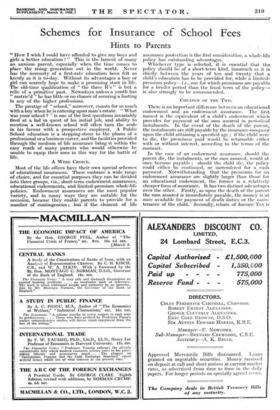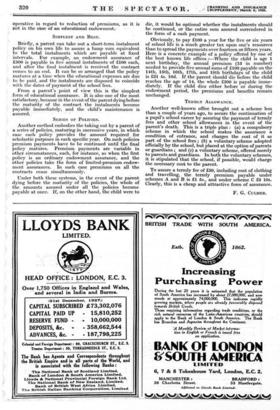Schemes for Insurance of School Fees
Hints to Parents
" How I wish I could have afforded to give my boys and girls a better education ! " This is the lament of many an anxious parent, especially when the time comes to place the rising generation out in the world. Never has the necessity of a first-rate education been felt so keenly as it is to-day. Without its advantages a boy or girl can scarcely hope to make a promising start in life. The old-time qualification of " the three R's " is but a relic of a primitive past. Nowadays unless a youth has " matric'd he has little or no chance of securing a footing in any of the higher professions.
The prestige of " school," moreover, counts for so much with a boy when he is entering upon man's estate. " What was your school ? " is one of the first questions invariably fired at a lad in quest of his initial job, and ability to mention a well-known school will often turn the scale in his favour with a prospective employer. A Public School education is a stepping-stone to the plums of a professional or a business career, and the facilities provided through the medium of life assurance bring it within the easy reach of many parents who would otherwise be unable to equip their sons in this way for the battle of life.
A WIDE CHOICE.
Most of the life offices have their own special schemes of educational insurances. These embrace a wide range of choice, and for essential purposes they can be divided into three groups, viz., short-term endowment assurances, educational endowments, and limited-premium whole-life policies. Endowment assurances are the most popular variety, and in many ways they are suitable for the occasion, because they enable parents to provide for a number of contingencies ; but if the element of life assurance protection is thefirst consideration, a whole-life policy has outstanding advantages.
Whichever type is selected, it is, essential that the policy should be of a short-term kind, inasmuch as it is chiefly between the years of ten and twenty that a child's education has to be- provided for, while a limited- premium policy—i.e., one for which premiums are payable for a briefer period than the fixed term of the policy— is also strongly to be recommended.
CHEAPER OF THE Two.
There is an important difference between an educational endowment and an endowment assurance. The first named is the equivalent of a child's endowment which provides for payment of the sum assured in periodical instalments. In the event of the death of the parent, the instalments are still payable by the insurance company upon the child attaining a specified age ; if the child were to die, the premiums paid would be returnable either with or without interest, according to the terms of the contract.
In the case of an endowment assurance, should the parent die, the instalments, or the sum assured, would at once become payable ; should the child die, the policy could either be continued, or surrendered for a cash payment. Notwithstanding that the premiums for an endowment assurance are slightly larger than those for an educational endowment, the former is a relatively cheaper form of assurance. It has two distinct advantages over the other. Firstly, as upon the death of the parent the sum assured is immediately payable, the money is at once available for payment of death duties or the main- tenance of the child. Secondly, rebate of Ineoule Tax: is
operative in regard to reduction of premiums, as it is not in the case of an educational endowment.
SIMPLEST AND BEST.
Briefly, a parent can take out a short-term instalment policy on his own life to assure a lump sum equivalent to the total instalments which are payable at fixed intervals. For example, an endowment assurance of £500 is payable in five annual instalments of £100 each, and after the final instalment is received the contract comes to an end. It can be so arranged that the policy matures at a time when the educational expenses are due to be paid, and the instalments are disposed to coincide with the dates of payment of the school fees.
From a parent's point of view this is the simplest form of educational assurance. It is also one of the most satisfactory, because in the event of the parent dying before the maturity of the contract the instalments become payable immediately, and the child's maintenance is assured.
SERIES OF POLICIES.
Another method embodies the taking out by a parent of a series of policies, maturing in successive years, in which case each policy provides the amount required for scholastic purposes in each specific year. On such policies premium payments have to be continued until the final policy matures. Premium payments are variable in other circumstances, such, for instance, as when the first policy is an ordinary endowment assurance, and the other policies take the form of limited-premium endow- ment assurances. In such case premiums on all the contracts cease simultaneously.
Under both these systems, in the event of the parent dying before the maturity of the policies, the whole of the amounts assured under all the policies become payable at once. If, on the other hand, the child were to die, it would be optional whether the instalments should be continued, or the entire sum assured surrendered in the form of a cash payment.
Obviously, to pay £100 a year for the five or six years of school life is a much greater tax upon one's resources than to spread the payments over fourteen or. fifteen years. Here is a concrete example of a policy offered by one of the best known life offices :—Where the child is age 1 next birthday, the annual premium (13 in number) needed to provide five annual sums of £100 payable on the 14th, 15th, 16th, 17th, and 18th birthdays of the child is £31 4s. 10d. If the parent should die before the child reaches the age of 14, the whole £500 is payable imme- diately. If the child dies either before or during the endowment period, the premiums and benefits remain unchanged.
TERMLY ALLOWANCE.
Another well-known office brought out a scheme less than a couple of years ago, to secure the continuation of a pupil's school career by assuring the payment of termly fees and other school allowances in the event of the parent's death. This is a triple plan : (a) a compulsory scheme in which the school makes the assurance a condition of entrance, and charges the cost of it as part of the school fees ; (b) a voluntary scheme adopted officially by the school, but placed at the option of parents or guardians ; and (c) a voluntary scheme, offered merely to parents and guardians. In both the voluntary schemes, it is stipulated that the school, if possible, would charge the necessary cost to the parent.
To assure a termly fee of 2.50, including cost of clothing and travelling, the termly premium payable under schemes A and B is £1 5s., and under scheme C £2 10s. Clearly, this is a cheap and attractive form of assurance.
F. G. CuLmF.a.































































 Previous page
Previous page